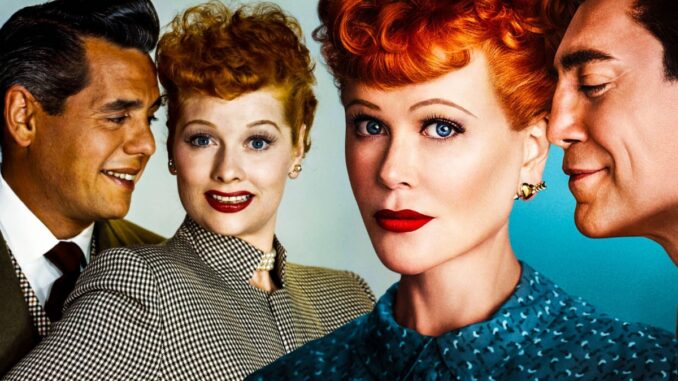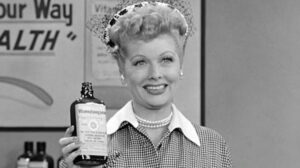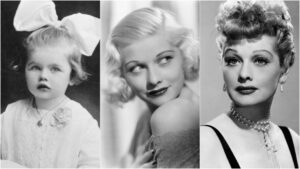
Lucille Ball wasn’t just a star. She was a revolutionary force who single-handedly transformed television with her timeless show I Love Lucy. Whether it’s the enduring influence of her comedic brilliance, the trailblazing production techniques, or the gender barriers she shattered, Lucille Ball left an indelible mark on the entertainment world. But how exactly did she change television? Let’s dive into the incredible impact Lucille Ball had and why her influence is still felt today.
The Birth of a Television Icon: Lucille Ball’s Early Career
Before I Love Lucy became a household name, Lucille Ball was a struggling actress in Hollywood, working her way up in a male-dominated industry. Her tenacity and determination paved the way for her eventual stardom.
From Radio to TV: The Transition to “I Love Lucy”

Ball’s successful radio show My Favorite Husband was the precursor to I Love Lucy. CBS executives recognized her talent and asked her to translate the show into a television series. This shift from radio to TV marked the beginning of something revolutionary.
Breaking New Ground: Lucille Ball as a Female Lead
At the time, female leads on television were few and far between. But Lucille Ball not only became the face of I Love Lucy, she also maintained full creative control, something unheard of for women in the 1950s. She wasn’t just another actress – she was in charge, and that changed the game.
The Creation of Desilu Productions: A Powerhouse Production Company
Lucille Ball co-founded Desilu Productions with her husband Desi Arnaz, making her one of the first female studio heads in Hollywood. Desilu was responsible for producing groundbreaking shows like Star Trek and The Untouchables. This demonstrated her impact behind the scenes, not just in front of the camera.
Pioneering the Multi-Camera Setup
One of the biggest technical innovations that I Love Lucy introduced was the multi-camera setup, which allowed for live studio audiences while still maintaining high production quality. This became the standard for sitcoms and is still used in television today.
Syndication and Reruns: The Business Genius of Lucille Ball

Lucille Ball was also a business-savvy pioneer when it came to television syndication. She was one of the first to realize the financial potential of reruns, ensuring I Love Lucy would continue to be watched for decades. This not only changed how shows were produced but also how networks made money.
The Revolutionary Dynamic of Lucy and Ricky Ricardo
The on-screen chemistry between Lucille Ball and her real-life husband, Desi Arnaz, was electrifying. They brought a new kind of humor to TV, blending slapstick comedy with heartfelt moments. Their portrayal of a Cuban-American marriage was groundbreaking, bringing diversity to a medium that was often very homogenous.
Shattering Stereotypes: A Latina on Primetime TV
Desi Arnaz, as a Cuban-American, broke barriers by being a leading man in primetime television. Lucille Ball fought for him to be cast, defying the studio’s initial reluctance. This was a significant moment for diversity in entertainment.
Pregnancy on TV: Breaking the Taboo
Another area where I Love Lucy pushed boundaries was in its depiction of pregnancy. When Lucille Ball became pregnant in real life, she insisted that the pregnancy be written into the show. At the time, pregnancy was considered too taboo for TV, but I Love Lucy addressed it head-on, making history with the birth of “Little Ricky.”
The Iconic Episode: “Lucy Goes to the Hospital”
The episode where Lucy gives birth was watched by more than 44 million viewers, even outpacing Dwight D. Eisenhower’s presidential inauguration in ratings. This was a turning point in how personal life events were portrayed on TV, making Lucille Ball a relatable figure to millions.
The Timeless Humor of “I Love Lucy”
Lucille Ball’s brand of physical comedy and impeccable timing turned I Love Lucy into a timeless classic. Whether it was stuffing chocolates in her mouth on an assembly line or getting tangled in a vat of grapes, her humor transcended language and culture, making the show universally beloved.
Influence on Female Comedians
Lucille Ball paved the way for countless female comedians. Icons like Carol Burnett, Tina Fey, and Amy Poehler have all cited her as an inspiration. Ball showed that women could be funny, smart, and lead a show without relying on male counterparts to carry the weight.
How “I Love Lucy” Redefined the Role of Women on TV
Lucille Ball’s portrayal of Lucy Ricardo was complex – she was funny, flawed, ambitious, and unapologetically herself. This multi-dimensional character broke away from the typical one-dimensional housewives that dominated TV screens at the time. Lucy wasn’t just a supporting character; she was the show.
Challenging Gender Roles in a Male-Dominated Industry
In a time when women were often relegated to secondary roles, Lucille Ball defied expectations. She showed that women could not only succeed in front of the camera but also run the show behind it. Her power extended beyond the screen, as she became a leader in the entertainment industry.
Lucille Ball’s Legacy on Modern Television
Many modern TV shows, from Friends to The Big Bang Theory, have taken cues from the structure, humor, and character dynamics of I Love Lucy. Lucille Ball’s influence is woven into the fabric of television, proving that her impact wasn’t just momentary – it was timeless.
The Enduring Popularity of “I Love Lucy”
Even decades after it first aired, I Love Lucy continues to be a beloved show around the world. Its humor, charm, and innovation have made it a classic that transcends generations.
Streaming and the New Era of Lucille Ball Fans
With the advent of streaming platforms, new audiences continue to discover I Love Lucy. The ability to watch the show anytime, anywhere, has brought Lucille Ball’s genius to younger generations who are just as enchanted by her comedic brilliance.
Conclusion: Lucille Ball’s Undying Impact on Television
Lucille Ball wasn’t just the star of a sitcom – she was a pioneer, a rule-breaker, and an innovator. I Love Lucy did more than make people laugh; it changed the television landscape forever. From its technical innovations to its groundbreaking approach to diversity, gender roles, and business strategy, Lucille Ball left an indelible mark on the entertainment industry. Her legacy continues to inspire future generations, proving that real brilliance never fades.